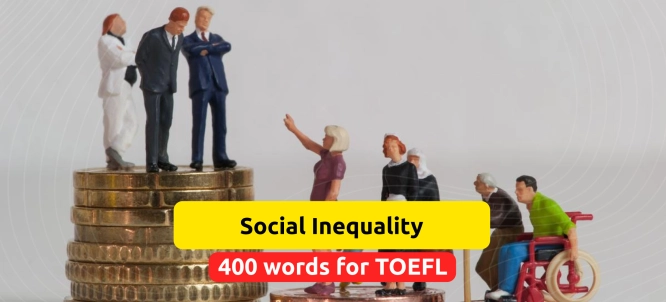by PushtoLearn
Social Inequality
Table of Contents
Social Inequality Flashcards - Vocabulary Practice for TOEFL
These exercises focus on Social Inequality Vocabulary
List of Social Inequality Words for the TOEFL
|
Word |
Definition |
Example |
|
Amend |
To make changes to a document, law, or system to improve it. |
The government plans to amend the policy to ensure fairness. |
|
Biased |
Showing preference or prejudice for or against something. |
The judge was accused of being biased in favor of the defendant. |
|
Burden |
A heavy responsibility or obligation. |
The high taxes became a financial burden for many families. |
|
Counter |
To oppose or act in response to something. |
Activists organized protests to counter the unjust law. |
|
De facto |
Existing in reality, even if not officially recognized. |
Segregation was de facto in many neighborhoods despite being illegal. |
|
Discriminate |
To treat someone unfairly due to differences such as race, gender, or age. |
Employers are prohibited from discriminating against applicants. |
|
Notion |
An idea, belief, or concept. |
The notion of equality is fundamental to human rights. |
|
Oppress |
To keep someone in hardship through unjust authority or power. |
The regime was accused of oppressing minority groups. |
|
Paradigm |
A model or example that influences how something is understood. |
The new educational paradigm emphasizes inclusion and diversity. |
|
Prejudiced |
Having a preconceived opinion or bias against a group or individual. |
He was clearly prejudiced against people from other cultures. |

Usage in TOEFL Exam Formats
Reading Section
-
Words like oppress, de facto, and discriminate often appear in passages discussing historical or contemporary social issues.
-
Example Question: What does the passage suggest about de facto segregation in the 20th century?
Listening Section
-
Terms such as paradigm, notion, and burden may be used in lectures about societal structures or ethical dilemmas.
-
Example: “The notion of fairness often clashes with societal biases.”
Writing Section
-
Use terms like amend, counter, and prejudiced to add sophistication to your essays.
-
Example Sentence: “Governments must amend outdated laws to counter systemic inequality.”
Speaking Section
-
Employ terms like biased, discriminate, or paradigm to articulate your thoughts clearly in speaking tasks.
-
Example: “A new paradigm in hiring practices can help eliminate biases in the workplace.”
Common Mistakes
-
Confusing "Amend" with "Change":
-
Mistake: "They will change the law to include more protections."
-
Correction: "They will amend the law to include more protections."
-
Overgeneralizing "Biased" to Mean Opinionated:
-
Mistake: "She was biased about her favorite book."
-
Correction: "She was biased in favor of her favorite book during the debate."
-
Misusing "De facto" for Official Status:
-
Mistake: "He is the de facto president of the company because he was elected officially."
-
Correction: "He is the de facto president, leading the company despite no formal title."
-
Using "Paradigm" for Any Model:
-
Mistake: "The paradigm of his desk organization is messy."
-
Correction: "The paradigm of education has shifted toward interactive learning."
-
Confusing "Prejudiced" with "Judgmental":
-
Mistake: "She was prejudiced about the restaurant's menu."
-
Correction: "She was prejudiced against certain ethnic cuisines without trying them."
FAQ
What does "amend" mean in societal contexts?
"Amend" refers to making improvements or corrections to laws, systems, or documents, often to address social issues.
How is "de facto" used in discussions about inequality?
"De facto" describes situations that exist in practice but are not officially recognized, such as informal segregation or systemic biases.
What’s the difference between "biased" and "prejudiced"?
"Biased" refers to showing preference or unfair favor, while "prejudiced" implies a preconceived, often negative, opinion against a group.
Why is "paradigm" important in TOEFL essays?
"Paradigm" adds depth when discussing shifts in societal models, such as changes in governance or education systems.
How can "oppress" and "discriminate" be distinguished?
"Oppress" refers to systematic control and hardship, while "discriminate" focuses on unfair treatment of individuals or groups.

